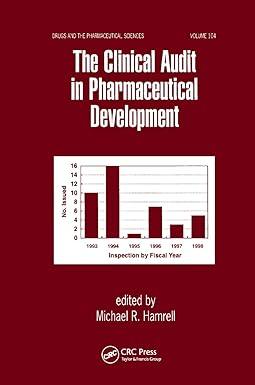Question
Basics of Variance Analysis, Variable Inputs Basuras Waste Disposal Company has a long-term contract with several large cities to collect garbage and trash from residential
-
Basics of Variance Analysis, Variable Inputs
Basuras Waste Disposal Company has a long-term contract with several large cities to collect garbage and trash from residential customers. To facilitate the collection, Basuras places a large plastic container with each household. Because of wear and tear, growth, and other factors, Basuras places about 250,000 new containers each year (about 20% of the total households). Several years ago, Basuras decided to manufacture its own containers as a cost-saving measure. A strategically located plant involved in this type of manufacturing was acquired. To help ensure cost efficiency, a standard cost system was installed in the plant. The following standards have been established for the product's variable inputs:
Standard Quantity Standard Price (rate in $) Standard Cost Direct materials 14 lbs. $ 3.5 $49 Direct labor 1.7 hrs. 14 23.8 Variable overhead 1.7 hrs. 6 10.2 Total $72.8 During the first week in January, Basuras had the following actual results:
Units produced 9,000 Actual labor costs $222,600 Actual labor hours 15,900 Materials purchased and used 124,000 lbs. @ $3.55 Actual variable overhead costs $ 119,340 The purchasing agent located a new source of slightly higher-quality plastic, and this material was used during the first week in January. Also, a new manufacturing process was implemented on a trial basis. The new process required a slightly higher level of skilled labor. The higher-quality material has no effect on labor utilization. However, the new manufacturing process was expected to reduce materials usage by 0.25 pound per container.
Required:
1. Conceptual Connection: Compute the materials price and usage variances. Assume that the 0.25 pound per container reduction of materials occurred as expected and that the remaining effects are all attributable to the higher-quality material. Would you recommend that the purchasing agent continue to buy this quality, or should the usual quality be purchased? Assume that the quality of the end product is not affected significantly.
Price $ Usage $ Select the effect. Enter the net amount of the effect. $ Select the correct decision. 2. Conceptual Connection: Compute the labor rate and efficiency variances. Assuming that the labor variances are attributable to the new manufacturing process, should it be continued or discontinued? In answering, consider the new process's materials reduction effect as well. If an amount is zero, enter "0".
Rate $ Efficiency $ Select the effect. Enter the overall net amount of the effect. $ Select the correct decision. 3. Conceptual Connection: Refer to Requirement 2. Suppose that the industrial engineer argued that the new process should not be evaluated after only one week. His reasoning was that it would take at least a week for the workers to become efficient with the new approach. Suppose that the production is the same the second week and that the actual labor hours were 12,000 and the labor cost was $168,000. Should the new process be adopted? Assume the variances are attributable to the new process. Assuming production of 9,000 units per week, what would be the projected annual savings? (Include the materials reduction effect.) If an amount is zero, enter "0".
Rate $ Efficiency $ Select the effect. Enter the annual amount of the effect. $ Select the correct decision.
Step by Step Solution
There are 3 Steps involved in it
Step: 1

Get Instant Access to Expert-Tailored Solutions
See step-by-step solutions with expert insights and AI powered tools for academic success
Step: 2

Step: 3

Ace Your Homework with AI
Get the answers you need in no time with our AI-driven, step-by-step assistance
Get Started


